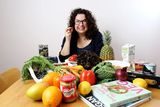What's your gut feeling?
The condition of our gut is central to our health and weight, so why do we ignore symptoms of bloatedness and indigestion? Suzanne Harrington talks to the belly experts who say it's time to get over the embarrassment of what comes out of us, and time to get real on what goes into us
This might be a bit personal, and not terribly sexy, but do you bloat? After eating bread, pasta and / or dairy, are you left with a distended stomach, feeling uncomfortable, maybe a bit crampy, a bit windy? Millions of people suffer from gut bloat and its related symptoms - cramping, stress-related diarrhoea, holiday constipation, a general feeling of fatigue connected to the gut, the body's sensitive 'second brain'. One in five visits to the GP are gut-related. We are essentially mobile digestive units.
But have we all now become allergic to gluten and lactose? Are we all such sensitive snowflakes that we can no longer digest basic food items effectively, or is the whole gluten / lactose intolerance thing a massive swizz to make us pay more for 'special' foods which have been engineered to exclude the dreaded ingredients that puff us up so unattractively, and cause such discomfort? And embarrassment? (In direct contrast to our obsession with what goes into our digestive system - food, in all its cultural culinary glory - we would rather die than talk about the business end of our digestive tract, which can result in serious conditions remaining undiagnosed. We can quite literally die of embarrassment).
Julian Walters, professor of gastroenterology at Imperial College London, urges us to "get over it" when it comes to gut-related issues. In his book What's Up With Your Gut?, he also discusses how we are increasingly hearing of "the latest 'miracle' exclusion diet, where cutting out wheat / gluten / dairy / lactose or sugar has apparently done wonders for bloating, diarrhoea or grumbling gut pain." However, in most cases, individuals undertaking such food exclusions will do so "without consulting their doctor or a dietitian and just hoping for the best."
Critics of exclusion diets, he says, believe that when bloating symptoms do improve, it's down to the placebo effect, or eating less overall, rather than a genuine sensitivity to the excluded food item.
In terms of nutrition trends, avoiding gluten is as fashionable as guzzling kale; we are so convinced that it is the root of all digestive evils that many of us are now gluten-free, despite only 1pc of the population actually being coeliac.
Coeliac disease is, however, on the increase . Research from the University of Nottingham in 2014 reveals a fourfold increase in the number of people diagnosed over the past 20 years, although many remain undiagnosed. Meanwhile, the rest of us are so keen on eschewing gluten that sales of gluten-free foods rose by 63pc in the US between 2012 and 2014. That's $8.8 billion spent in 2014 alone on food that is on average, 15pc more expensive than its all-gluten equivalent. So why do we bother paying extra for staples like bread with the gluten removed, and which so often doesn't taste as good as the real thing? Is it a form of collective food neurosis?
Actually, no - it really can make us bloat, and worse. Non-coeliac gluten sensitivity (NCGS) is medically recognised. Gastroenterologist Kamran Rostami, writing in the British Medical Journal, estimates that there are between four and seven million people in the UK with the condition. These are people who bloat, feel uncomfortable, pained or have diarrhoea after consuming gluten, yet test negative for coeliac disease. (When I eat anything made from white flour, I fall asleep; it's like taking a valium).
But it's not gluten which is the biggest cause of food intolerance. It is milk. As in cow's milk, a substance designed for infant ruminants, rather than adult humans; problems in the gut arise not from being allergic to cow's milk, but from lacking lactase, the enzyme needed to break down lactose, the sugar found in milk.
People from China, Africa and the Caribbean are more likely to be lactose intolerant than Europeans, but even among dairy-mad northern Europeans, there is still a one in 10 chance of lactose intolerance.
So how do we reduce bloat? Professor Walters cites research from the Australian University of Monash, where 74pc of patients with irritable bowel syndrome symptoms - bloating, cramping, diarrhoea, which affects around 15pc of the population at any given time - stated improvement when they followed a diet low in short-chained carbohydrates.
These are called FODMAPs, which is an abbreviation of fermentable oligosaccharides, disaccharides, monosaccharides and polyols (no, me neither), and have a high occurence in some of our most everyday foods - onions, garlic, beetroot, Savoy cabbage, apples, pears, mangos, fruit juices, beans, lentils, bread and pasta. Oh dear.
No wonder vegans - regretfully I must include myself here - have a reputation of being so farty. Milk and dairy are also high in FODMAPs. Even sugar-free gum and 'diet' yoghurt can cause bloat, because they contain sorbitol, which is, you've guessed it, a high FODMAP food.
A low FODMAP diet can work well in reducing bloat and other IBS-type symptoms. It's not a cure, but is being suggested by some doctors as a first-line treatment. It does require some forethought and dedication - but it's not impossible to stick to, as many low FODMAP foods are everyday items: you can start by eating porridge with a tablespoon of flaxseeds to reduce wind.
"Many dietitians are now trained in the low FODMAP diet and can give you advice about how to eliminate and reintroduce foods high in these sugars, so ask your doctor for a referral," writes Professor Walters.
Or if you have the time and the money, you could take your troubled gut on its own special holiday, to a place called the Gut Retreat in Menorca. Run by Jeanette Hyde, author of the Gut Makeover, it promises all kinds of gut-tastic treatments to reduce bloat, sluggishness, and other related symptoms.
"The state of our gut is central to our weight and health," says Hyde. "So if we want to look and feel good for the long term, we need a diet that creates a high-performance digestive system. We have entered the gut-health era of diet and nutrition."
What are FODMAP foods?
High FODMAP foods that can exacerbate bloating / IBS symptoms
Veg: Asparagus, artichokes, onions, leeks, garlic, sugar snap peas, beetroot, Savoy cabbage, celery, sweetcorn
Fruit: Apples, pears, mango, watermelon, nectarines, peaches, plums
Dairy: Cow milk, yoghurt, cream, soft cheese, custard, ice cream
Protein: Legumes, pulses
Bread and cereals: Wheat bread and pasta, wheat-based cereals, rye
Snacks: Rye crackers, wheat biscuits
Nuts and seeds: Cashews, pistachios
Low FODMAP foods that can relieve bloating / IBS symptoms
Veg: Alfalfa, bean sprouts, green beans, bok choy, bell peppers, carrot, chives, fresh herbs, courgette, cucumber, lettuce, tomato.
Fruit: Bananas, oranges, mandarins, grapes, melons
Dairy: Lactose-free milks and yoghurts, hard dairy cheese
Protein: Meat, fish, tofu, tempeh
Bread and cereals: Gluten-free bread and pasta, spelt, oats, rice, quinoa
Snacks: Rice cakes, corn thins
Nuts and seeds: Almonds, pumpkin seeds
- from Monash University
1. Eat one mince pie instead of two - save 185 calories
2. Skip the pudding and cream after dinner (you can have it for tea later on instead of something else) - save 329 calories
3. Have a glass of water when you are drinking alcohol - cutting out one glass of wine will save you 100 calories
4. Have mashed potato and skip the roasties - save 379 calories for three medium roast potatoes
5. Have a small portion of turkey instead of a large one - save 120 calories
6. Have a small portion of ham instead of a large one - save 170 calories
7. Eat two chocolates instead of four - save around 90 calories
8. Don't munch on bowls of crisps and nuts at parties, just take a few and then move away. 30 grams of crisps contains around 150 calories and a handful of nuts gives you 256 calories
9. Staying active over Christmas also has huge benefits for your body and mind. Get outside, clear your head and walk your way to a healthier Christmas
10. For more information visitindi.ie and safefood.eu -
- Dr Cliona Foley Nolan in conversation with Arlene Harris
Avoid Christmas bloat
Christmas bloat
"Indigestion can be a particular problem at this time of year due to the increased opportunities for rich meals and alcohol, and this change in eating habits means that your digestive system may not cope so well," says Louise Reynolds of the Irish Nutrition and Dietetic Institute.
"Partly it's due to quantity; you feel full and overstretched as you eat literally more than you are used to and this can lead to a feeling of fullness which can cause food to come back up from the stomach leading to heartburn.
"On top of this, alcohol tends to be over consumed at parties too, and the excess of carbonated (fizzy) soft drinks and sparkling wines and Prosecco can cause problems.
"The bubbles can lead to bloating and the sugars in the alcohol can be fermented in the gut, leading to a feeling of distension which can be very sore and uncomfortable - so at this time of year, many people actually stock up on antacid tablets to carry in their handbag or coat pocket."
The experienced dietitian has a few tips to help revellers make the most of the season without inflicting too much on their digestive systems.
• Get-togethers with lots of pastry and meat-based canapés can be popular as Christmas comes closer. If you eat lots of the canapés on offer with drinks and then sit down to a large, rich meal, it can be a recipe for a very uncomfortable night. So limit yourself to small amounts.
• When it comes to traditional Christmas meals, large portions of stuffing, gravies, rich creamy sauces and roast potatoes can all add up to a much richer, higher fat meal than usual. While enjoying the festivities, keep an eye on portion size and start with smaller portions, going back for seconds if needed
• If you suffer from irritable bowel syndrome (IBS) generally and find that the symptoms are worse in the run up to Christmas, it may be worth keeping a note of IBS episodes and then visiting a registered dietitian in the New Year to discuss dietary management of your symptoms.
• If drinks such as champagne or Prosecco cause bloating, alternate your drinks with glasses of still water (fizzy water may add more gas to the problem) - this will also help your calorie intake and the effects of alcohol the morning after.
- Arlene Harris
Join the Irish Independent WhatsApp channel
Stay up to date with all the latest news














